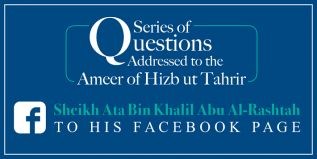بسم الله الرحمن الرحيم
Is the Theory of Social Contract the Same as the Bay’ah Pledge of Allegiance that Islam Legislated to Appoint a Ruler?
(Translated)
https://www.al-waie.org/archives/article/19993
Al Waie Magazine Issue No. 470
Thirty-Ninth Year, Rabi’ al-Awwal 1447 AH corresponding to September 2025 CE
Many intellectuals have exaggerated in their comparison of the theory of social contract of Jean-Jacques Rousseau and other European Enlightenment philosophers to the bay’ah (pledge of allegiance) established by Islam. The theory of social contract of Rousseau and others does not address how the ruler assumes power, although they address this issue in some of their theories.
The basic idea of the theory of social contract is that people agree on a way of life, whereby members of society give up some of their personal freedoms to agree on collective norms. They then bind the ruler they appoint to this agreed-upon way of life and the legislation and laws they enact. All of these matters, the constitution, the laws, and the legislation, are all subject to contract. Hence, the term “democracy” later emerged to express the same idea, as it was not common in the time of Rousseau and other Enlightenment philosophers.
However, the term was later invoked from ancient Greek history, and became popular to express the same meaning, that the people have the right to enact legislation and laws, and consequently, they have the right to choose their ruler and, consequently, to hold them accountable.
Therefore, it is not sufficient for there to be a similarity in the issue of the people choosing their ruler to say that the social contract theory exists in Islam, or that Islam preceded Jean-Jacques Rousseau and the Europeans hundreds of years ago in establishing what is called the theory of social contract. No, the theory of social contract has no connection to Islam, is not similar to what it presented, and is radically different from Islam.
While the theory of social contract states that society agrees on a particular way of life and on systems it enacts, and obligates the ruler to implement the systems and laws he enacts and desires, Islam does not give the people or the ruler the right to choose legislation, as everyone is subject, without choice, to Islamic Shariah Law. Allah (swt) says,
[وَمَا كَانَ لِمُؤۡمِنٖ وَلَا مُؤۡمِنَةٍ إِذَا قَضَى ٱللَّهُ وَرَسُولُهُۥٓ أَمۡرًا أَن يَكُونَ لَهُمُ ٱلۡخِيَرَةُ مِنۡ أَمۡرِهِمۡۗ وَمَن يَعۡصِ ٱللَّهَ وَرَسُولَهُۥ فَقَدۡ ضَلَّ ضَلَٰلٗا مُّبِينٗا]
“It is not for a believing man or woman—when Allah and His Messenger decree a matter—to have any other choice in that matter. Indeed, whoever disobeys Allah and His Messenger has clearly gone far astray.” [TMQ Surah Al-Ahzab: 36]. Therefore, there is no legislative authority that imposes on the ruler and the state the legislation it chooses in the Islamic State.
The only voluntary contract between the ruler and the ruled is a contract to select and appoint this ruler, while both parties are obligated to implement Islamic Shariah Law. The Ummah has no right to demand that systems and laws be changed from Islam to something else, and the ruler also has no right to submit to the people’s desire to choose a single legislative ruling from outside Islam, nor to choose to implement any legislation other than Islam.
In conclusion, the bay’ah pledge of allegiance prescribed by Islam is not the same as the theory of social contract, whether according to Jean-Jacques Rousseau or anyone else.




